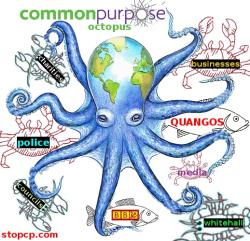MOBILE VERSION
COMMON PURPOSE MEMBERS ('GRADUATES')
 The main way that Common Purpose is subverting Britain is by infiltrating their 'graduates' into managerial positions of power in national and local government, the media, the NHS, the military, the police and the judiciary.
The main way that Common Purpose is subverting Britain is by infiltrating their 'graduates' into managerial positions of power in national and local government, the media, the NHS, the military, the police and the judiciary.
Database of some CP members supplied by Brian Gerrish 2009-12-09 (.xls spreadsheet file).
A list of some BBC employees who have attended Common Purpose courses.
Common Purpose needs these 'graduates' to run the social control bureaucracy of the British regions of the European Union in what they call the 'post-democratic' society.
People become Common Purpose 'graduates' for career advancement and to be part of a secret, Masonic-like society for careerists who want what Common Purpose has to offer - access to the corridors of power.
Some Common Purpose members think they are the 'chosen people'. In reality, they have been selected for their corruptibility, suggestibility, stupidity and cupidity. They are useful idiots.
The term 'graduate' is used deliberately so as to prevent disclosure of involvement with Common Purpose. As 'member' of Common Purpose, which is more appropriate, individuals in the public sector would have to declare their interests.
Common Purpose creates the illusion that it is for ordinary people, but it is run by an élite for an élite. You do not become a Common Purpose 'graduate' unless you are in the right job, have the right influence and conform to the politically-correct Common Purpose collective mindset. In order to qualify as a Common Purpose 'graduate', candidates have to pass the Common Purpose 'correct thinking' schemes.
There is a strong resistance amongst Common Purpose 'graduates' towards giving out details of their Common Purpose membership and the activities they engage in. Common Purpose operates according to the Chatham House rules which means that meetings are held in secret with no agenda, records or accountability.
So strong is the Common Purpose bond, that some individuals will lie to hide information and documents considered 'dangerous' to the Common Purpose cause. People challenging Common Purpose colleagues have been victimised and forced out of their positions.
If Common Purpose has nothing to hide, if Common Purpose is not sinister, then why do organisations keep from the public the names of persons who have attended Common Purpose courses? What have they to hide?
Common Purpose 'graduates' are corrupt and treacherous crooks who are totally untrustworthy. Some of these 'graduates' are 'useful idiots' who do not realise just how evil Common Purpose is.
How to Find Common Purpose Members ('Graduates')
You can make Freedom of Information (FOI) requests online free, gratis and for nothing here.
If the people you want to find out about are employed by a public body, you could try making a Freedom of Information (FOI) request to the body they work for asking specifically if Mr X has ever attended a Common Purpose training course. Also ask if they are a Common Purpose 'graduate', when they attended the course, how much the courses they attended cost and who paid. You might strike lucky.
You can simply ask for a list of members of that organisation who are Common Purpose 'graduates'. You might get lucky or you might get a "we don't keep those records centrally and it will cost too much to find out" type of answer.
It is a good idea to explain what Common Purpose is because some of the people who handle these FOI requests appear not to know, so you can say something like "By Common Purpose, I mean the training organisation of that name: http://www.commonpurpose.org/home.aspx By Common Purpose 'graduate', I refer to a specific class of person who has passed the advanced Common Purpose courses."
If you do not get a reply...
If they do not reply to you within 20 working days - i.e. about a month, I suggest you do two things:
1. Write to them again and ask for an internal review of the request
2. Complain to the Information Commissioner's Office here or write to them here.
Here is a sample request:
[ENTER NAME HERE] - Common Purpose training
Dear Sir or Madam,
1. Has [ENTER NAME HERE] ever attended a Common Purpose training course? If so, please list the courses they have attended, their dates, their cost and details of who paid for them.
2. Is [ENTER NAME HERE] a Common Purpose 'graduate'?
By 'Common Purpose', I mean the training organisation of that name: http://www.commonpurpose.org/home.aspx By 'Common Purpose graduate', I refer to a specific class of person who has passed the advanced Common Purpose courses.
Yours faithfully,
[YOUR NAME]
Here is another sample request:
[ORGANISATION NAME] - Common Purpose courses: expenditure and invoices
Dear Sir or Madam
Please provide details of:
1. the names and ranks/grades, departments and job titles of all
employees in your organisation who have attended Common Purpose
courses.
2. the total expenditure on Common Purpose courses for each year
from 1997 to date together with a copy of the invoice for each
Common Purpose course paid for by your organisation.
By 'Common Purpose', I mean the training organisation of that name:
http://www.commonpurpose.org
Yours faithfully,
[YOUR NAME]
If someone is not employed by a public body, then things are more difficult. You could try asking them, I suppose. There is certainly no point in asking Common Purpose - you won't get much out of them.
Happy hunting... remember Common Purpose can't stand people asking questions about them.
Here are some of the methods organisations use to avoid disclosure of information under Freedom of Information (FOI) requests:
1. Section 40(2) of the Freedom of Information Act (2000)
Here is an example of identical requests made to different constabularies:
a. to the Devon and Cornwall Constabulary who provided names of CP graduates and expenditure on CP courses
Click here
b. to the Norfolk Constabulary who refuse to provide the names CP graduates but provide expenditure details:
Click here
The get-out clause is:
"Under Section 40(2) of the Freedom of Information Act (2000), personal information is exempt from
disclosure if such a disclosure would breach any of the principles laid down under the Data
Protection Act (1998). The first Principle of the Data Protection Act (1998) states that:
"Personal data shall be processed fairly and lawfully, and, in particular shall not be processed unless
(a) at least one of the conditions in Schedule 2 is met, and
b) in the case of sensitive personal data, at least one of the conditions in Schedule 3 is also met."
In this case, members of the Constabulary have undertaken training courses provided by "Common Purpose" for reasons of personal development, and not as a requirement to perform their role as members of the Constabulary. Disclosure of the information you have requested does not meet any of the conditions of Schedule 2, also members of the Constabulary would have no expectation that their names would be published, and therefore to do so in response to a Freedom of Information request would be unfair to those individuals. Under Section 17 of the Freedom of Information Act (2000) this serves as a refusal notice for this aspect of your request, by virtue of the application of Section 40(2) of the Freedom of Information act (2000)."
Note: Any civil servant or policeman who undergoes training at the cost of the taxpayer can only do so if it is of benefit to the taxpayer, i.e. as a part of their public service function. If a public authority uses public money for private development then it is breaking the law. Common Purpose often uses the excuse of 'personal development' when referring to the activities of its members, especially when the actions of those members impacts financially upon the taxpayer. This argument is specious.
2. Section 40(2) of the Freedom of Information Act (2000) again:
a. here someone asked the Royal Borough of Windsor and Maidenhead Council for copies of invoices which were provided in full:
Click here
b. here someone asked the Greater London Authority a similar question and got copies of the invoices with the names blanked out - Section 40(2) exemption:
Click here
Once again the same exemption as invoked by the Norfolk Constabulary is used:
"Some of the information you requested is being withheld as it falls under the exemption in section 40 of the Freedom of Information Act. The below annex sets out the exemption in full. It also includes a schedule of the information withheld."
3. Asking about individuals
Look at the hoops they are jumping through at the BBC to avoid answering a question about Mark Thompson, Director-General of the BBC:
Click here
And the Met is a bit slow when it comes to answering about Cressida Dick:
Click here
Why can't they just ask the people concerned?
Here is a reply about Ed Balls (at least the answer is straight... assuming they are telling the truth)
Click here
And from the Chief Constable of Norfolk - the Section 40(2) exemption AGAIN (this exemption is very popular!):
Click here
If Common Purpose has nothing to hide, if Common Purpose is not sinister, then why do organisations keep from the public the names of persons who have attended Common Purpose courses? What have they to hide?
4. Asking for too much information - the section 12 exemption
If you ask for too much information they will probably turn round and say that it will cost too much to provide:
Click here
Which is fair enough, I suppose.
5. Information not held
This is a valid response.
Click here
What question should you ask? Well, you pays your money and takes your choice.
Here are some ideas:
1. Do not ask for too much information otherwise they will cite the the section 12 exemption.
2. I think the invoice questions are a good idea. I believe that public bodies are legally required to provide copies of invoices on request but the names may be blanked out to protect the guilty.
3. You should include wording along the lines of:
'By Common Purpose, I mean the training organisation of that name: www.commonpurpose.org/home.aspx By Common Purpose 'graduate', I refer to a specific class of person who has passed the advanced Common Purpose courses.'
because some of the people who process these requests appear not to know what CP is.
4. If you make FOI requests on the whatdotheyknow.com website, you do not have to give your real name.
5. If they refuse to disclose information, they MUST give a reason.
Update 2008-08-13
All these questions have given Common Purpose the jitters. Because they have so much to hide, Common Purpose cannot stand having questions asked about them and are now using their network of 'graduates' to put pressure on public authorities to refuse to answer questions about Common Purpose on the grounds that they are 'vexatious'.
This is an outrageous interference with the public's right to learn what public authorities are up to and how public money is spent.
Quote from here:
"Another website, Stop CP, encourages readers to submit Freedom of Information requests to their local authorities to find out who has attended the charity's training courses.
A spokeswoman for Common Purpose said that the charity was concerned at the volume of FOI requests being made about it. 'These appear to have the aim of causing disruption and harassment to Common Purpose as a third party, and, consequently, to the public authority itself,' she said.
Common Purpose now forwards its list of 130 previous FOI requests, including names of applicants, to help local authorities decide whether new requests about the charity are vexatious."
How to Find Out Even More About Common Purpose
You can find out how to contact your local councillors and ask them about Common Purpose activities here.
*The photograph is of English comedian Harry Enfield as 'Loadsamoney' - one of his many characters.
|
|
|



 The main way that Common Purpose is subverting Britain is by infiltrating their 'graduates' into managerial positions of power in national and local government, the media, the NHS, the military, the police and the judiciary.
The main way that Common Purpose is subverting Britain is by infiltrating their 'graduates' into managerial positions of power in national and local government, the media, the NHS, the military, the police and the judiciary.






